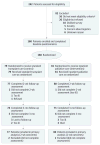Effect of Inpatient Palliative Care on Quality of Life 2 Weeks After Hematopoietic Stem Cell Transplantation: A Randomized Clinical Trial
- PMID: 27893130
- PMCID: PMC5421101
- DOI: 10.1001/jama.2016.16786
Effect of Inpatient Palliative Care on Quality of Life 2 Weeks After Hematopoietic Stem Cell Transplantation: A Randomized Clinical Trial
Abstract
Importance: During hospitalization for hematopoietic stem cell transplantation (HCT), patients receive high-dose chemotherapy before transplantation and experience significant physical and psychological symptoms and poor quality of life (QOL).
Objective: To assess the effect of inpatient palliative care on patient- and caregiver-reported outcomes during hospitalization for HCT and 3 months after transplantation.
Design, setting, and participants: Nonblinded randomized clinical trial among 160 adults with hematologic malignancies undergoing autologous/allogeneic HCT and their caregivers (n = 94). The study was conducted from August 2014 to January 2016 in a Boston hospital; follow-up was completed in May 2016.
Interventions: Patients assigned to the intervention (n=81) were seen by palliative care clinicians at least twice a week during HCT hospitalization; the palliative intervention was focused on management of physical and psychological symptoms. Patients assigned to standard transplant care (n=79) could be seen by palliative care clinicians on request.
Main outcomes and measures: Primary: change in patient QOL from baseline to week 2; secondary: patient-assessed mood, fatigue, and symptom burden scores at baseline, 2 weeks, and 3 months after HCT and caregiver-assessed QOL and mood at baseline and 2 weeks after HCT.
Results: Among 160 enrolled patients (mean age, 60 [SD, 13.3] years; 91 women [56.9%]; median hospital stay, 21 days) and 94 caregivers, 157 (98.1%) and 89 (94.7%), respectively, completed 2-week follow-up, and 149 patients (93.1%) completed 3-month follow-up. Patients in the intervention group reported a smaller decrease in QOL from baseline to week 2 (mean baseline score, 110.26; week 2 score, 95.46; mean change, -14.72) compared with patients in the control group (mean baseline score, 106.83; week 2 score, 85.42; mean change, -21.54; difference between groups, -6.82; 95% CI, -13.48 to -0.16; P = .045). Among the secondary outcomes, from baseline to week 2, patients in the intervention group vs those in the control group had less increase in depression (mean, 2.43 vs 3.94; mean difference, 1.52; 95% CI, 0.23-2.81; P = .02), lower anxiety (mean, -0.80 vs 1.12; mean difference, 1.92; 95% CI, 0.83-3.01; P < .001), no difference in fatigue (mean, -10.30 vs -13.65; mean difference, -3.34; 95% CI, -7.25 to 0.56; P = .09), and less increase in symptom burden (mean, 17.35 vs 23.14; mean difference, 5.80; 95% CI, 0.49-11.10; P = .03). At 3 months after HCT, intervention patients vs control patients had higher QOL scores (mean, 112.00 vs 106.66; mean difference, 5.34; 95% CI, 0.04-10.65; P = .048) and less depression symptoms (mean, 3.49 vs 5.19; mean difference, -1.70; 95% CI, -2.75 to -0.65; P = .002) but no significant differences in anxiety, fatigue, or symptom burden. From baseline to week 2 after HCT, caregivers of patients in the intervention group vs caregivers of patients in the control group reported no significant differences in QOL or anxiety but had a smaller increase in depression (mean, 0.25 vs 1.80; mean difference, 1.55; 95% CI, 0.14-2.96; P = .03).
Conclusions and relevance: Among adults at a single institution undergoing HCT for hematologic malignancy, the use of inpatient palliative care compared with standard transplant care resulted in a smaller decrease in QOL 2 weeks after transplantation. Further research is needed for replication and to assess longer-term outcomes and cost implications.
Trial registration: clinicaltrials.gov Identifier: NCT02207322.
Conflict of interest statement
Figures


Comment in
-
The Promise of Palliative Care: Translating Clinical Trials to Clinical Care.JAMA. 2016 Nov 22;316(20):2090-2091. doi: 10.1001/jama.2016.17163. JAMA. 2016. PMID: 27893113 No abstract available.
-
Inpatient Palliative Care After Hematopoietic Stem Cell Transplantation.JAMA. 2017 Mar 28;317(12):1275-1276. doi: 10.1001/jama.2017.0535. JAMA. 2017. PMID: 28350918 No abstract available.
References
-
- McQuellon RP, Russell GB, Rambo TD, et al. Quality of life and psychological distress of bone marrow transplant recipients: the “time trajectory” to recovery over the first year. Bone Marrow Transplant. 1998;21(5):477–486. - PubMed
-
- Prieto JM, Atala J, Blanch J, et al. Patient-rated emotional and physical functioning among hematologic cancer patients during hospitalization for stem-cell transplantation. Bone Marrow Transplant. 2005;35(3):307–314. - PubMed
Publication types
MeSH terms
Associated data
Grants and funding
LinkOut - more resources
Full Text Sources
Other Literature Sources
Medical

